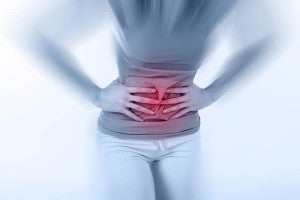
going-under-in-routine-colonoscopies
More than just the Stomach Bug?

Is it Just a Stomach Bug?
When we suffer from stomach issues, we often dismiss it as a “stomach bug” that will be wiped away within a couple of weeks. Although this may be the case some of the time, with some individuals it can be much more serious. If you are suffering from chronic discomfort in your abdominal region, it may be time to consider other factors that may be causing you this irritation.
Peptic Ulcer Disease
One common overlooked stomach illness is known as Peptic Ulcer Disease. This occurs when painful sores or ulcers form on the lining of the stomach, often caused by an infection within the bacteria Helicobacter pylori. Anti-inflammatory drugs such as Ibuprofen, Motrin, and Advil may increase your risk to contract this unpleasant disease. Nausea, vomiting and chronic stomach pain are the key side effects to this illness.
Crohn's Disease
Crohn's disease is an inflammatory bowel disease (IBD), that causes inflammation within the lining of your digestive tract. The ilium, colon and gastrointestinal tract are severely damaged during this attack on the body. The inflammation of the digestive tract caused by Crohn's disease can lead to severe abdominal pain, severe diarrhea, fatigue, weight loss and malnutrition.
Delayed Stomach Emptying
In some cases, the stomach is simply unable to empty out its contents in a normal fashion. The vagus nerve is responsible for proper function of the digestive system and when it is damaged, the muscles of the stomach are not able to do their job correctly. Symptoms may include heartburn, nausea, vomiting undigested food, feeling full quickly when eating, abdominal bloating, poor appetite and weight loss and poor blood sugar control.
Gastroenteritis
The most common type of stomach illness that is just passed off as a stomach bug is Gastroenteritis. This occurs when your stomach and intestines become inflamed and irritated. This is commonly caused by a bacterial or viral infection. Symptoms include severe nausea, vomiting and diarrhea. This is often more severe than common flu symptoms.
Whatever stomach issue you may be battling, the NoMo Nausea Band offers an all-natural treatment for your unpleasant symptoms. Peppermint aromatherapy acts as a muscle relaxant for both your stomach muscles as well as your muscles in the rest of your digestive tract. While the aromatherapy works to settle your stomach instantly, the acupressure works to send anti-nausea hormones straight to your brain. With the NoMo Nausea Band, these irritating symptoms now become more manageable.

Uncovering the Hidden Truth About Digestive Disorders
The Silent Agony of Gastritis
Gastritis, often overlooked, is a common digestive disorder characterized by inflammation of the stomach lining. This condition can lead to symptoms such as stomach pain, bloating, and nausea. It is essential to address gastritis promptly as it can progress to more severe complications if left untreated.
Exploring the Depths of Irritable Bowel Syndrome (IBS)
Irritable Bowel Syndrome (IBS) is a chronic gastrointestinal disorder that affects the large intestine. Individuals with IBS may experience abdominal pain, bloating, and changes in bowel habits. Managing stress, diet modifications, and medication can help alleviate symptoms and improve quality of life for those living with IBS.
Unraveling the Mystery of Celiac Disease
Celiac Disease is an autoimmune disorder triggered by the consumption of gluten-containing foods. This condition damages the small intestine and can lead to malabsorption of nutrients. Maintaining a strict gluten-free diet is essential for individuals with Celiac Disease to manage symptoms and prevent complications.
FAQs About Digestive Disorders
What are the common symptoms of digestive disorders?
Common symptoms of digestive disorders include abdominal pain, bloating, gas, diarrhea, constipation, and nausea. It is essential to consult a healthcare provider for proper diagnosis and treatment.
How can diet affect digestive disorders?
Diet plays a crucial role in managing digestive disorders. Avoiding trigger foods, such as spicy or processed foods, can help alleviate symptoms. Incorporating fiber-rich foods and staying hydrated are also key to maintaining digestive health.
When should I seek medical attention for digestive issues?
If you experience persistent or severe abdominal pain, unexplained weight loss, blood in stool, or changes in bowel habits, it is important to seek medical attention promptly. These symptoms could indicate a more serious underlying condition that requires intervention.
Buy the Best Motion Sickness Bracelet
NoMo Nausea is a 3 and 1 essential oil infused pressure bracelet that is clinically proven to stop nausea or vomiting in seconds. Imagine a life with a comfortable pregnancy, and enjoyable day at sea, a family fun car trip, or just a hangover free weekend? That's what NoMo Nausea bracelet can do for you. So say no more to your nausea or upset stomach.
You can find NoMo Nausea on https://nomonausea.com and get 25% off with the coupon PUKE25.

Dr. in Naturopathy answers
1. What are the potential causes of digestive disorders beyond just a stomach bug? 2. How can the NoMo Nausea Band provide natural relief for stomach symptoms? 3. Why is it important to seek medical attention for digestive issues such as Peptic Ulcer Disease and Crohn's Disease? 4. Can delayed stomach emptying be a sign of a more serious digestive disorder? 5. Is gastroenteritis more than just a routine stomach bug? Summary: Dive deeper into the world of digestive disorders and learn about natural relief options with the NoMo Nausea Band in this informative blog post. For more information on dealing with digestive disorders, check out this related blog from NoMo Nausea: https://nomonausea.com/blogs/healthandwellness/117725507-dealing-with-digestive-disorders.


